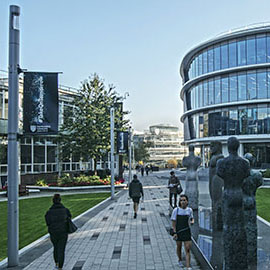-
Study
Study
Interested in studying at Northumbria? With 31,500 students, Northumbria is one of the largest universities in the country, offering courses on either a full-time, part-time or distance learning basis.
Discover more-
Undergraduate
- Undergraduate Study Degree
- Undergraduate Open Day & Events
- Application Guides
- Northumbria University UCAS Exhibitions
- Foundation Years
- Undergraduate Fees & Funding
- School & College Outreach
- Continuing Professional Development
-
Postgraduate
- Postgraduate Study Degree
- Postgraduate Research Degrees
- Postgraduate Open Days and Events
- Postgraduate Fees & Funding
- Flexible Learning
- Thinking about a Masters?
- Continuing Professional Development
- Change Direction
-
Student Life
- The Hub - Student Blog
- Accommodation
- Life in Newcastle
- Support for Students
- Careers
- Information for Parents
- Students' Union
- Northumbria Sport
-
-
International
International
Northumbria’s global footprint touches every continent across the world, through our global partnerships across 17 institutions in 10 countries, to our 277,000 strong alumni community and 150 recruitment partners – we prepare our students for the challenges of tomorrow. Discover more about how to join Northumbria’s global family or our partnerships.
Discover more-
Applying to Northumbria
- European Union
- Our London Campus
- Northumbria Pathway
- International Events
- Entry Requirements
- Agent Network
-
Northumbria Language Centre
- Faculty Requirements
- Acceptable English Requirements
- Pre-Sessional English and Study Skills
- Academic Language Skills Programmes (ALS)
-
International Fees, Funding & Scholarships
- International Undergraduate Fees
- International Undergraduate Funding
- International Masters Fees
- International Masters Funding
- International Postgraduate Research Fees
- International Postgraduate Research Funding
- International Money Matters
-
Life at Northumbria
- International student support
- The Hub - Student Blog
- Careers
-
International Mobility
- Current Northumbria Students
- Incoming Exchange Students
-
-
Business
Business
The world is changing faster than ever before. The future is there to be won by organisations who find ways to turn today's possibilities into tomorrows competitive edge. In a connected world, collaboration can be the key to success.
Discover more -
Research
Research
Northumbria is a research-rich, business-focused, professional university with a global reputation for academic quality. We conduct ground-breaking research that is responsive to the science & technology, health & well being, economic and social and arts & cultural needs for the communities
Discover more -
About Us
-
About Northumbria
- Our Strategy
- Our Staff
- Our Partners
- Student Profiles
- Alumni Profiles
- Leadership & Governance
- Academic Departments
- University Services
- History of Northumbria
- Contact us
- Online Shop
-
-
Alumni
Alumni
Northumbria University is renowned for the calibre of its business-ready graduates. Our alumni network has over 237,000 graduates based in 178 countries worldwide in a range of sectors, our alumni are making a real impact on the world.
Discover more - Work For Us
What will I learn on this module?
In this module, you will critically examine the relationship between US filmic institutions (films and industrial bodies – hereafter “cinema”) and different social contexts, including, for example: changes to the Hollywood Studio System (and the birthing of the “New Hollywood”), cinema’s responses to war and global trauma, and cinema’s engagement with issues surrounding race, gender and sexuality. Taught through lectures, demonstrations (film screenings) and student-led seminars, the course explores many of the ways cinema has engaged with key societal concerns.
You will be required to read and reflect on specific theoretical and empirical academic work by leading scholars and commentators and, using your analytical and interpretive skills, relate this work to the issues raised in class and by the accompanying film screenings. The module is assessed by a 3000 word essay which is designed to test your knowledge of film history and industry (one of the world's major mass communications industries), to evidence a sophisticated understanding of the issues under scrutiny, and your ability to work to a deadline. Ultimately, the module asks you to consider: What is the significance of studying cinema as a mass communications industry, an outlet for personal expression, and as a political tool? What can cinema tells us about history? What can cinema tell us about ourselves?
How will I learn on this module?
The course will be taught via a series of lectures and seminars. Students are also required to watch one set film per week and, in some cases, may be required to view additional material.
Each lecture will introduce a key film and situate it within its original social (and historical/industrial) context. The lectures will be accompanied by relevant screenings. In the seminars, the issues raised in the lecture/by the film will be discussed in relation to academic literature.
The 3000 word essay aims to ensure that students are able to work and think independently and critically about cinema and society. Reading-based seminars aim to ensure that the students engage with secondary reading. Formative feedback will come from their peers and the module tutor throughout the course will develop their skills, their ability to work independently and collaboratively; thereby identifying strengths and weaknesses in their learning strategies. This will come in addition to the written summative feedback the student will received having completed the 3000 word essay.
How will I be supported academically on this module?
You will be academically supported by the module tutor with whom you can make private appointments during their scheduled office hours. These are in place to encourage you to seek advice on course-related materials, including course content and the final assessment.
The seminars will also provide an arena of academic support both from classmates and the module tutor during group discussion. Such discussions are encouraged to aid in your ability to solve problems, to develop robust peer support networks, and to develop key transferable skills that can be employed in the workplace.
What will I be expected to read on this module?
All modules at Northumbria include a range of reading materials that students are expected to engage with. The reading list for this module can be found at: http://readinglists.northumbria.ac.uk
(Reading List service online guide for academic staff this containing contact details for the Reading List team – http://library.northumbria.ac.uk/readinglists)
What will I be expected to achieve?
You will be able to demonstrate specialist knowledge of the issues, themes and scholarly debates that characterise the study of cinema in relation to key social concerns.
You will be able to demonstrate analytical and interpretive skills required to formulate and justify independent critical viewpoints regarding cinema's engagement with complex social issues
You will be able to demonstrate an enhanced ability to select from an array of appropriate research methods, theories, and concepts relevant to cinema and society, and deploy said approaches in order to produce appropriately sophisticated written work
On completion of the module you will possess detailed knowledge of cinema as a mass communications industry
Intellectual/Professional Skills & Abilities
You will display your ability to work independently, including organising your time and meeting deadlines
You will display your ability to participate in collaborative discussions, including being confident in challenging others’ ideas
You will display your ability to communicate effectively to diverse audiences in seminars
You will display a clear understanding of how to build upon the transferable skills you have attained during the degree programme as part of your continuing development beyond university
Personal Values Attributes
You will be able to display the attitudes and skills needed to engage and work constructively, sensitively and ethically in conjunction with people from various socio-cultural backgrounds and with divergent skill-sets
How will I be assessed?
You are required to submit a 3000 word essay worth 100% of the overall module grade. The assessment is designed to assess the your ability to write, research, process and reflect on, complex ideas pertaining to cinema and society.
You will have tutorials in the final week of the semester in which the module tutor will feedback to you regarding your individual progress on the module (your contribution to seminars, attendance, and so forth) based on observations made during teaching sessions.
You will be assessed on your ability to conduct analysis and think critically during the lectures and seminars. This will test your ability to critically engage with film across different historical periods. Class discussions in seminars will also be used to assess your understandings of the concepts outlined in the lectures, and the key reading you will have conducted.
You will receive formative feedback from your peers and the module tutor during the seminars throughout the course, allowing you to apprehend how your analytical skills are developing. You will receive both formative commentary and a summative mark on your written work. You are encouraged to reflect on your methodological choices throughout the course, allowing you to formatively assess your own performance beyond the seminars. The summative assessment will be accompanied with feedback that will support future learning by indicating areas for development, both in your critical skills, and your methodological practices.
Pre-requisite(s)
NA
Co-requisite(s)
NA
Module abstract
N/A
Course info
UCAS Code P3N1
Credits 20
Level of Study Undergraduate
Mode of Study 3 years full-time or 4 years with a placement (sandwich)/study abroad
Department Arts
Location City Campus, Northumbria University
City Newcastle
All information is accurate at the time of sharing.
Full time Courses are primarily delivered via on-campus face to face learning but could include elements of online learning. Most courses run as planned and as promoted on our website and via our marketing materials, but if there are any substantial changes (as determined by the Competition and Markets Authority) to a course or there is the potential that course may be withdrawn, we will notify all affected applicants as soon as possible with advice and guidance regarding their options. It is also important to be aware that optional modules listed on course pages may be subject to change depending on uptake numbers each year.
Contact time is subject to increase or decrease in line with possible restrictions imposed by the government or the University in the interest of maintaining the health and safety and wellbeing of students, staff, and visitors if this is deemed necessary in future.
Your Learning Experience
Find out about our distinctive approach at
www.northumbria.ac.uk/exp
Admissions Terms and Conditions
northumbria.ac.uk/terms
Fees and Funding
northumbria.ac.uk/fees
Admissions Policy
northumbria.ac.uk/adpolicy
Admissions Complaints Policy
northumbria.ac.uk/complaints













